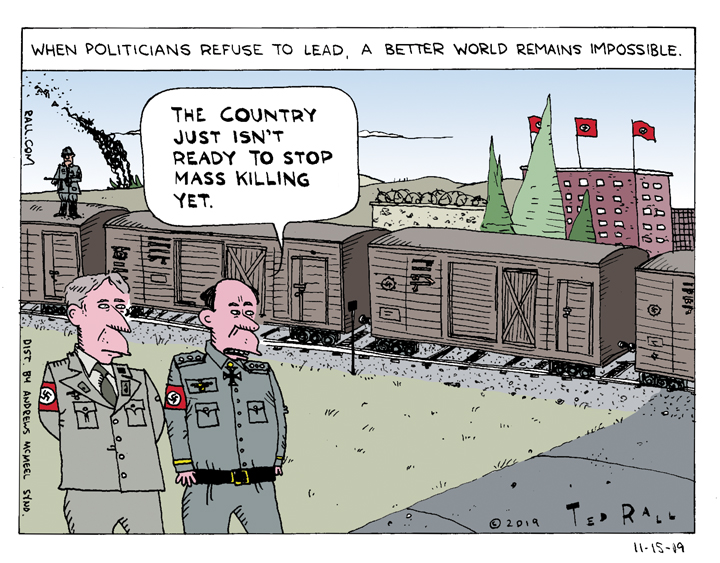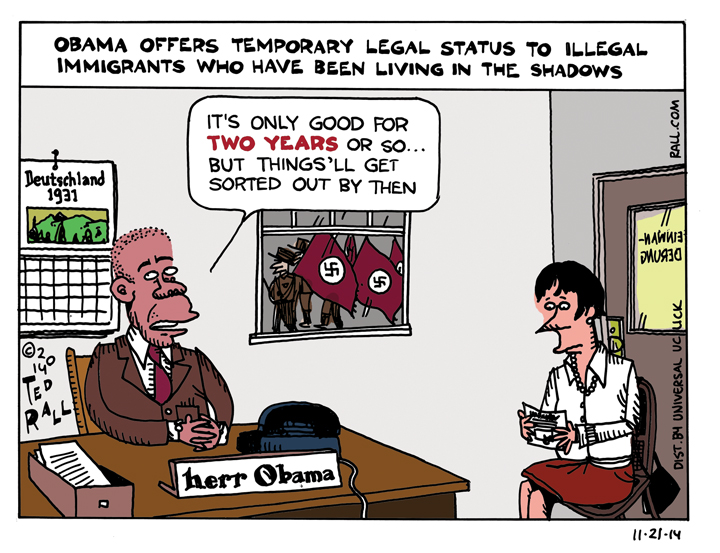Democrats’ idea of “resistance” to Trump is considerably less substantial than actual resistance to fascism looked like during World War II. And it probably shouldn’t have started with a unanimous vote for neoconservative maniac Marco Rubio.
The TMI Show Ep 8: What Is Fascism?
As a history major at Columbia University, The TMI Show’s own Ted Rall’s thesis advisor was Professor Robert O. Paxton. Paxton wrote THE book on French fascism, “Vichy France.” He went on to write THE book on fascism writ large, “The Anatomy of Fascism.” Now age 92, Paxton recently gave an interview in which he cautiously agreed with the description of the MAGA movement led by former President Donald Trump as fascist in the traditional 20th century sense of the word. Kamala Harris has also weighed in, calling Trump himself a fascist.
What is fascism? Does Trump fit the bill? What about Trumpism?
Ted and TMI Show Guest Co-host Scott Stantis explain fascism’s historical origins in Italy after World War I through its radical manifestation in Nazi Germany and work to answer the question: is Donald Trump, with a 50% chance of winning the 2024 presidential election, a fascist?
Neither Democrats Nor Republicans Can Defeat Trumpism

As you know if you are one of my regular readers, I’m skeptical of hysterical claims that Donald Trump and his supporters represent a uniquely existential threat to democracy and the American way of life. Right-wing populist demagogues are a recurring feature of American history; there is nothing new here. Many “mainstream” politicians have promoted and promulgated policies that stepped over the line into fascism: the Red Scares of the Palmer raids and McCarthyism, concentration camps for Japanese Americans, the John Birch society, COINTELPRO, mass surveillance by the NSA, George W. Bush’s war of aggression against Iraq and assassination drones come to mind.
Trump had four full years in office, one of which was marked by a bona fide national emergency, the COVID-19 pandemic, that he might have exploited to impose martial law, yet the republic still stands.
Trump notwithstanding, it is true that democracy, even the watered-down worn-out version of our ancient republic, is fragile. Those wary of authoritarianism can never be too vigilant. So I’m always interested in what people perceive as a threat to the current system – and what they fail to see.
New York Times writer David Leonhardt is an intelligent mainstream subscriber to Trump Derangement Syndrome. The former president, he argues, represents a double-barreled attack on American democracy. First, Trump’s refusal to accept his loss to Joe Biden spreads the virus of delegitimization. If nothing else, elections are supposed to settle the question of which candidate is most popular. If they don’t, what’s the point of holding them?
The second threat, Leonhardt says, is that “the power to set government policy is becoming increasingly disconnected from public opinion.” The far-right Supreme Court, gerrymandering, the Senate filibuster, voter suppression and the Electoral College result in laws and rulings to the right of what most voters want.
The sore loser concern seems overblown. Disputed elections followed by large segments of the population who refused to accept the results have occurred repeatedly. 42% of Republicans thought Obama was born in Kenya, meaning that he was unqualified to run for president. 85% of Democrats said they believed Bush cheated in the 2000 election. Conservatives thought JFK cheated Nixon out of a win in 1960 and strongly disapproved of FDR’s decision to break tradition and run for a third term in 1940. Rutherford B. Hayes became president in 1876 but there’s no doubt that his ascent to the White House was the result of the most scurrilous skullduggery imaginable. Trump’s bitching is hardly unprecedented.
The gap between the right-wing politics of Congress and the Supreme Court and a relatively left electorate is mitigated by the decision of most liberals to live where their values are codified by legislation; New Yorkers, after all, still have abortion rights. Though blue staters may feel anger and sympathy for women who can’t get the procedure in the Deep South, those emotions are academic rather than visceral. Pitchfork-wielding liberals won’t be a thing any time soon.
My apologies for burying the lede, but the we-are-in-unusual-peril argument that leaps out at me is that “mainstream” corporatist—read, non-populist, country-club—Republicans are in bed with Trump… and that that makes all the difference. Leonhardt quotes Harvard Professor Steven Levitsky, co-author of the book “How Democracies Die.”
“When mainstream parties tolerate these guys, make excuses for them, protect them, that’s when democracy gets in trouble,” Levitsky says. “There have always been Marjorie Taylor Greenes. What I pay closer attention to is the behavior of the Kevin McCarthys.” Republican House Leader McCarthy, he points out, has backed up Greene despite her violent rhetoric.
Leonhardt correctly points out that something similar happened during the 1930s in Germany and other European countries. Hitler came to power with the support of traditional conservative parties whose leaders thought they could control the “Austrian corporal.” These louche establishmentarians “typically do not initiate attacks on democratic rules or institutions but who also do not attempt to stop these attacks. Through their complicity, these semi-loyal actors can cause a party, and a country, to slide toward authoritarianism.”
For decades Democrats have moaned: why don’t “respectable” Republicans speak out against the extremist Birchers/Klansmen/neoconservatives/Proud Boys/Trumpies/QAnoners in their midst?
The answer is that right-wing extremism is not a fringe group.
It is the Republican base.
Racism, xenophobia, homophobia, supporting violent policing are all baseline beliefs of the “mainstream” GOP. Far-right groups like those who gathered for the Unite the Right rally in Charlottesville provide the muscle, intellectual grounding and excitement for a Republican Party that without them would be doomed to permanent minority status. “Acceptable” Republicans like McCarthy and Mitch McConnell aren’t so much afraid of being voted out or physically assaulted if they were to criticize Trump as they are afraid of losing a vital part of their party constituency.
The few Republicans who criticize Trump and by extension the right-wing populist wing of the party commit personal political suicide and risk destroying their basic coalition. Liz Cheney aside, it’s not going to happen. Anyway, Cheney is an outlier who recognizes that her future is to get hired by MSNBC as a token fake Republican.
Returning to the rise of Nazism, the only real threat to Hitler and his goons in the 1930s was Germany’s left-wing parties, the communists and the socialists. Left-wing parties maintained paramilitary organizations that took on the Nazi brownshirts in the streets. With over 30% of the vote between them—1.5 million votes more than the Nazis—German leftists were numerous and militant enough to hold the Nazis at bay at the ballot box as well as in the streets.
Tragically and stupidly, however, the less militant socialists refused to join an alliance of convenience with the communists. Writing from exile, communist Leon Trotsky asked German socialists: “The policies of our parties are irreconcilably opposed; but if the fascists come tonight to wreck your organization’s hall, we will come running, arms in hand, to help you. Will you promise us that if our organization is threatened you will rush to our aid?” As the SPD dithered, the Nazis seized power with the complicity of traditional conservative parties. When socialists and communists finally came together, it was as inmates in Nazi concentration camps.
There is no point clinging to the foolish Democratic hope that corporate Republicans will cut Trumpies loose. The lesson of the 1930s is that the only force that can defeat an energetic and well-organized far right (and its Republican Party allies) is an energetic and well-organized far left.
(Ted Rall (Twitter: @tedrall), the political cartoonist, columnist and graphic novelist, co-hosts the left-vs-right DMZ America podcast with fellow cartoonist Scott Stantis. You can support Ted’s hard-hitting political cartoons and columns and see his work first by sponsoring his work on Patreon.)
A Few Bad Apples
It’s one of the most common shibboleths in our culture: only a few “bad apples” among the police are responsible for the abuse. And while it is true that police abuse seems to be concentrated by certain policemen, it’s also true that the entire system is completely corrupt. That goes double when you consider the cult of silence in most police departments.
Why Are Politicians Waiting for the People? They Are Supposed to Lead
Whenever people push for positive change whether it be gay rights, equal rights for women, equality of income, or even something as basic as healthcare for everyone, centrist moderates always say the same thing: the country just isn’t ready yet. But politicians aren’t supposed to wait for the people to be ready for positive change. They are supposed to lead. That means making the case for the better world that is possible and pushing until it is achieved.
Victims Must Unite With Their Oppressors
A spate of shootings of innocent black men by white police was followed by a mass shooting of 12 policemen in Dallas. Afterwards, Very Reasonable People assured us that it was up to “both sides” – blacks and the police who oppress, abuse and kill them – to put their differences aside and compromise to achieve peace. Actually, it’s always up to the oppressors to stop oppressing.
SYNDICATED COLUMN: The Four Horsemen of the American Apocalypse

What the Media Can’t/Won’t Tell You About Why Russia Invaded Ukraine
As usual, America’s foreign correspondents are falling down on the job.
Stories devoid of historical context cast Russia’s invasion of Ukraine as a naked act of neo-Soviet aggression. Considering that the relevant history begins a mere two decades ago, its omission is inexcusable.
The spark that led to the takeover of Crimea was not the overthrow of President Viktor Yanukovich. It is what happened the day after.
A 2012 law gave the Russian language official status in regions where Russians comprise more than 10% of the population. This is the case in most of eastern Ukraine and particularly in Crimea, where 59% are ethnic Russians.
One week ago, Ukraine’s rump parliament (members of Yanukovich’s party, hiding from opposition forces and in fear for their lives, didn’t show up) took advantage of Yanukovich’s downfall to overturn the language law. Americans didn’t notice, but Russians did.
“Attack on the Russian language in Ukraine is a brutal violation of ethnic minority rights,” Konstantin Dolgov, the Russian Foreign Ministry’s commissioner for human rights, tweeted that day.
Seems a little over-the-top, right?
Sure, but only if you don’t know that millions of ethnic Russians in former Soviet Republics have suffered widespread discrimination and harassment since the 1991 collapse — and that their troubles began with laws eliminating Russian as an official language.
Laws like the one passed last week in Ukraine.
The demise of the Soviet Union left 25 million Russians stranded in 14 newly independent states, in such countries as Belarus, Azerbaijan, Turkmenistan and Ukraine. These new countries had to scramble in order to create the trappings of national identity virtually overnight. They designed new flags, composed national anthems and printed new currency.
To instill a sense of loyalty and patriotism, the governments of many of the freshly-minted republics resorted to rank nationalism.
Nationalism isn’t just about what your country is. It’s also about what it isn’t. This requires defining some things — some people — as outsiders. Unwanted. Scapegoats. Enemies of the state.
Turkmenistan, a Central Asian dictatorship and former Soviet republic in Central Asia, is one example. It instituted a policy of “Turkmenization” after 1991. Russians, a privileged group before independence, were now refused work permits. A 2000 decree banned the use of the Russian language in official business; since Turkmenistan is a totalitarian state and all business is legally governmental, this reduced Russians who didn’t speak Turkmen to poverty and low-status jobs.
The Turkmen government abolished dual Turkmen-Russian citizenship, leading to the mass exodus of panicked Russians in 2003. Denaturalization — the stripping away of citizenship — followed. “Many people…were having to sell houses and apartments at far below market values in order to leave by the deadline,” reported the UN. Hundreds of thousands of people lost everything they owned.
“Over the past decade Russians have been systematically discriminated against, and currently hold no positions in Turkmenistan’s government or state institutions,” says the report.
Russians who remained behind after 2003 fared poorly. “On the streets of the eastern city of Turkmenabat, Russians appear to be rapidly becoming an underclass in a nation mired in poverty. Many scrape a living as taxi drivers, waitresses or in other low paying, insecure jobs.”
Harassment of Russians is rife throughout the former USSR. Every other Commonwealth of Independent States nation has abolished dual citizenship.
In the former Soviet Union, everyone knows that the road to statelessness, unpersonhood and poverty begins with the official elimination of Russian as an official language.
National language statutes targeted against Russian speakers are analogous to Nazi Germany’s Nuremberg Laws, which prevented Jews from holding jobs or even owning a radio: the beginning of the end. At the end of the Soviet period in 1989, the Tajik SSR passed a law establishing Tajik as the sole official language. Less than two decades later, 85% of ethnic Russians had left the country.
“The linguistic nationalization carried out in each republic provided a strong impetus to emigrate…Even if schools systematically introduce children to the official language today, the [former Soviet] states have established no programs to train adults,” Seymour Peyrouse noted in a 2008 report for the Woodrow Wilson Institute about the Central Asian republics. “It seems that the principal cause of emigration remains the absence of a future, or the perception of such, for the younger generations.”
Given recent history, it shouldn’t surprise anyone that ethnic Russians freaked out when one of the first official acts of Ukraine’s parliament was a linguistic nationalization law.
As for Russia’s response, you need to know two facts. First, Ukraine isn’t as independent of Russia as, say, Poland. None of the former Soviet republics are. “Kiev is an ancient Russian city,” Masha Gessen writes in Vanity Fair. “It is an overnight train ride from Moscow — closer than 90% of Russia is to the Russian capital. Russian citizens haven’t needed visas or even foreign-travel passports to go to Ukraine — the way U.S. citizens can enter Canada with only a driver’s license. Every store clerk, waiter, and taxi driver in Kiev speaks Russian.” And of course there’s the Black Sea Fleet. Really really independent countries don’t have 11,000 foreign troops stationed on their soil.
Had it been possible for rational diplomats and demographers to manage the Soviet collapse, Crimea probably would have wound up in Russia.
Until half a century ago, after all, Crimea was Russian. Nikita Khrushchev “gifted Crimea to Ukraine as a gesture of goodwill to mark the 300th anniversary of Ukraine’s merger with tsarist Russia. Not surprisingly, at the time, it did not occur to anyone that one day the Soviet Union might collapse and that Ukraine would again be an independent country,” writes The Moscow Times.
It’s easy to see why Vladimir Putin would invade, why Russian public opinion would support him, and why neither cares what America thinks. Back in September, after all, most Russians told pollsters Crimea is part of Russia.
Why are American reporters covering Crimea ignoring the big picture, and instead so focused on secondary distractions like how it makes Obama look and whether there’s a chance of a new Cold War?
Four horsemen of the journalism apocalypse afflict overseas reporting:
Journalistic stenography, in which attending a government press conference constitutes research.
Kneejerk patriotism, where reporters identify with their government and are therefore less likely to question its actions, while reflexively assuming that rivals of the U.S. are ill-intentioned.
Jack-of-all-trades journalism, in which the same writers cover too many different beats. A few decades ago, there would have been a bureau chief, or at least a stringer, who knew Ukraine and/or the former Soviet Union because he or she lived there.
American ahistoricism, the widespread and widely acceptable ignorance of politics and history — especially those of other countries.
All four horsemen are pulling the Crimea story, but the fourth — not being aware of stuff that happened just one generation ago — is the most embarrassing.
(Support independent journalism and political commentary. Subscribe to Ted Rall at Beacon.)
COPYRIGHT 2014 TED RALL, DISTRIBUTED BY CREATORS.COM
SYNDICATED COLUMN: Good Reasons to Hate Big Tech
We love computers and other electronics, but — not unlike an addict’s opinion of his dealer — we hate the companies that sell them to us. Now our contempt for Silicon Valley is expanding to include tech workers.
In San Francisco, where locals know the techies best, 30-year-old worker bees are taking as much heat as their billionaire CEO overlords.
Geographical familiarity breeds political contempt.
Just as Zuccotti Park gave birth to Occupy Wall Street’s clarion cry against the predator class henceforth to be known as the Banksters, San Francisco bus stops have become ground zero in a backlash against Big Tech. Oversized SUV-like buses that ferry Google staffers down the Peninsula provoke anger by clogging public transit stops in a city whose crumbling fleet of city vehicles is starved of funding. Private tech company buses have been blocked by protesters who object to gentrification fueled by the soaring rents paid by deep-pocked tech workers. A bus window got smashed. Across the bay in Berkeley, demonstrators even showed up at the home of a Google engineer to hold him to account for his dual role as tech dystopian (he runs Google’s creepy robot car project) and real estate developer.
Save for a window and a few Google worker tardy notices, nothing has been harmed. Days of Rage this ain’t.
Despite the relative mellowness of it all, any hint that American leftism is livelier than a withered corpse prompts establishmentarians into anxious fits that the streets will soon run red with the blood of fattened-on-organic-veal-and-green-smoothies technorati. In Salon, the usually steady Andrew Leonard lectured San Francisco’s dispossessed that street actions like slashing bus tires are “bullshit,” opining that “delivering passionate rhetoric at a public hearing on city policy toward private shuttles is part and parcel of how a democratic society operates.” (Or doesn’t operate, by his very own account.)
“This is a very dangerous drift in our American thinking,” Tom Perkins, an 82-year-old venture capitalist who helped fund the initial launch of Google, wrote in an instantly infamous letter to the The Wall Street Journal, comparing dislike of 1%ers to Nazi attacks on Jews. “Kristallnacht was unthinkable in 1930; is its descendant ‘progressive’ radicalism unthinkable now?” (Note to Perkins: You’re old enough to remember that Nazism was a right-wing movement.)
“With spokesmen like Mr. Perkins,” David Streitfeld responded in The New York Times, “the tech community will alienate the entire country in no time.”
Gallup’s 2011 poll of public perceptions found that Americans view the tech sector more positively than any other industry but that, I think, is not going to last. Because there are lots of good reasons to hate Big Tech.
The root of our contempt for the tech biz is that all our economic eggs are in their basket. Manufacturing is never coming back. Whatever chance the U.S. economy has of recovering from the 2008-09 collapse (and, for that matter, the 2000-01 and 1989-93 recessions) lies with the tech sector. But the technies don’t care. And they’re barely employing anyone.
Facebook has 6,300 employees, Twitter has 2000, Instagram has 13.
The Big Three auto companies each employ between 2.5 million and 3 million workers directly or through subsidiaries and contractors.
It’s not like Facebook couldn’t use more American workers. Because Mark Zuckerberg can never grab enough loot for himself, Facebook does without the basics, like customer service reps. They don’t even have a phone number.
It’s hard to feel warm and fuzzy about companies that don’t hire us, our neighbors or, well, anyone at all.
Or answer the phone.
Fair or not, we feel vested in tech. The average American spends thousands of dollars a year on electronics and tech-related services, including broadband Internet. Objectively, we spend more on housing, food and energy — but those expenditures feel impersonal. Unlike our devices, we’re not constantly reminded of them.
Smartphones, tablets and desktop computers are central to our minute-by-minute lives, serving as a constant reminder of our material support to the digerati.
Every time we pick up our iPhone, we recall the $400 we spent on it. (And the $300 on its once cool, now lame, two-year-old precursor.) This makes us think of historic, extravagant profits pocketed by their makers. We can’t help but remember the over-the-top paychecks collected by their makers’ CEOs, including the incompetent ones. Also popping to the front of our consciousness is the despicable outsourcing of manufacturing to slave labor contracting firms like Foxconn, where abused Chinese workers attempt suicide so often that the company had to install netting around dormitory windows. Charmingly, Foxconn began requiring new hires to sign an agreement releasing the company from liability if they kill themselves.
Few industries gouge consumers as ferociously as wildly profitable tech outfits like Microsoft, Adobe and Apple.
Not only have Americans been reamed by Big Tech — they know they’ve been reamed. Which sets the stage for big-time resentment.
In the past, wealthy companies and individuals mitigated populist resentment by paying homage to the social contract — i.e., by giving back. Henry Ford paid assembly line workers more than market rates because he wanted them to be able to afford his cars. 19th century robber barons like J.P. Morgan and Cornelius Vanderbilt built museums and contributed to colleges and civic organizations. These gestures helped keep socialism at bay.
Whether it’s due to the influence of technolibertarianism, pure greed or obliviousness, tech titans are relative skinflints compared to the manufacturing giants they’ve supplanted. Yes, there’s the Bill and Melinda Gates Foundation (though its “philanthrocapitalism” model is staggeringly ineffective). But Steve Jobs kept almost every cent. Facebook and Twitter are basically “non-players” in the philanthropy world. Google doles out roughly 0.02% of its annual profits in charitable grants.
Some say the techies aren’t cheap — just skittish. “A lot of the wealthy in Silicon Valley are newly wealthy,” said E. Chris Wilder, executive director of the Valley Medical Center Foundation in San Jose. “That money still feels a little too tenuous; still feels fleeting. And the economic downturn has reinforced that feeling.”
Whatever the cause, underemployed and overcharged Americans expect tech’s 1% to start stepping up.
(Support independent journalism and political commentary. Subscribe to Ted Rall at Beacon.)
COPYRIGHT 2014 TED RALL, DISTRIBUTED BY CREATORS.COM






